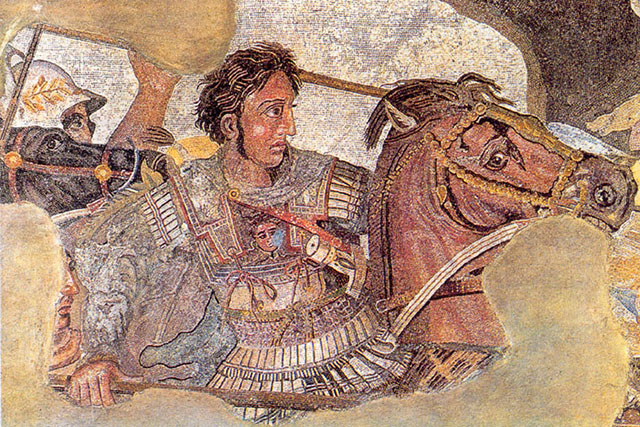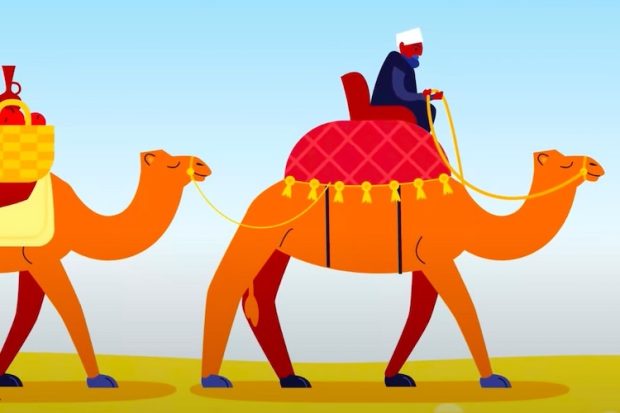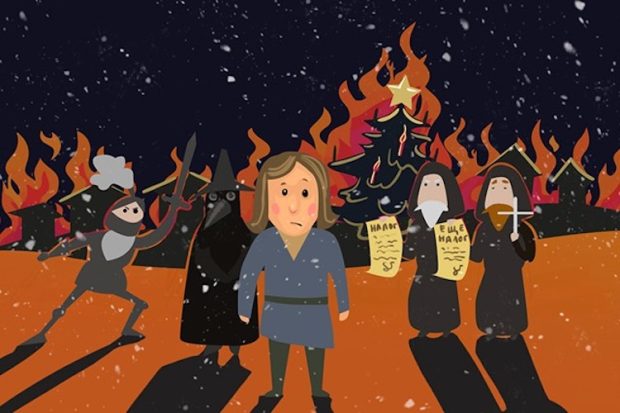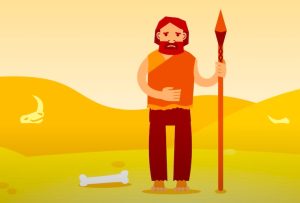Human Sacrifice in Aztec Culture
Historian David L. Carrasco on violent practices of the Aztecs, the purpose of human sacrifice, and the select...

There are very few figures from the ancient world who can play a role in the modern world, and Alexander the Great is one of them. His significance is that, for example, his campaigns in Afghanistan and Iraq have a lot of similarities to Western involvement in those regions today. He came across people from totally different cultures and from very different sociocultural backgrounds. He had to try to rule them and relate to them. Very often, he would fail simply because he did not understand or try to appreciate their local customs, especially if they went across Greek beliefs or customs. We can study how Alexander tried to bridge the gap between West and East and especially not so much for his success or failure, but for how he went about it. We can learn a lot of lessons from his campaign that can be applicable to makes of modern strategy in different multicultural regions of the world today.
We don’t know when and by whom he was first called ‘great’. Probably this was not during his lifetime. The very first time he’s referred to as ‘Great’ is in a Roman comedy of the 1st century BC where he is called ‘Magnum’ (the Latin word for ‘great’). Thus at some point between his death in 323 BC and the first century BC, he’s come to be seen as ‘great’. Most likely, the Romans called him ‘great’ because they were people who measured greatness by the number of ‘body bags’. A victorious Roman general had to have killed 5,000 of the enemy before he was allowed a triumph through the streets of Rome to cheer crowds. Alexander coldly massacred hundreds of thousands of native peoples during his campaign, and at times in Afghanistan and India, he and his army were wiping out entire tribes – at times, it was genocide! Today if Alexander was alive, he would be put on trial for war crimes. But his great military victories, his strategic genius, and the high enemy death count were the sorts of things that would appeal to the Romans.

The ‘greatness’ of Alexander doesn’t come from the fact that he was a king, or that he was worshipped as a God by some of his subjects, or that he died young at the height of his power – he was 33 – but because of his military career. There’s no question that Alexander was a genius when it came to military strategy and battle tactics. He was always faced with a larger army than his own wherever he went, and he waged some really tough battles and sieges, but he was always victorious. It’s very easy to see why Alexander would be called ‘great’ – because of his military expertise and his military genius. But Alexander was not just a general – he was a king. He was, therefore, a general, a politician, a statesman, a diplomat, and a leader! When you start to look at the whole ‘package’ of Alexander, you can see some very serious flaws in his character. And that’s why I think greatness is not such a good word to apply to him unless people know that we’re referring to his military greatness.
The most important figure in his life was his father, Philip II of Macedonia. Philip was a better king in terms of what he did for his kingdom, for his country and how he remained a typical Macedonian warrior king until his death, more so than Alexander. Philip didn’t conquer an empire as vast as Alexander’s, and he doesn’t have that military reputation as Alexander does, but as a king, he discharged his duties to his kingdom better than Alexander, and even some ancient writers recognized that.
When Philip came to the throne in 359, Macedonia was just a social and cultural backwater. It didn’t have an economy; it had a poorly trained conscript army – it was in a mess. Philip turned this all around. In 23 years as king, he created a professional and fearsome army that Alexander took to Asia with him – the best army in the ancient world before the Romans. He introduced economic policies that made Macedonia very wealthy as a kingdom, and then he started to expand his borders, eventually taking over all of Greece. It was actually Philip who decided that he was going to invade the Persian Empire after he had conquered the Greeks, and he was all set to do that. In the summer of 336 BC, he was ready to invade, and just a few days before the invasion, he was assassinated. So the plan to invade Persian Empire wasn’t Alexander’s – he inherited it from his father and decided he was going to go further than what Philip may have envisaged so that he could outdo his father. The fact that Philip left him this very stable and wealthy kingdom and this powerful army allowed Alexander to accomplish what he did.

Intellectually Alexander was very clever. At the age of 6 or 7, he could play the lyre, and apparently, he could converse with adults about all sorts of adult things. He read the whole of Greek literature – Homer was his hero. And, of course, Alexander was taught by Aristotle when he was a teenager from 14 to 16. But the greatest influence on Alexander was not Aristotle but his father, Philip. Alexander, for most of his life, wanted to emulate him, but then as he grew older and began to enjoy some military successes of his own, he wanted to outdo Philip and be greater than him – he wanted to be a fourth-century Achilles.
At the age of 16, for example, Philip made Alexander Regent of Macedonia, while Philip campaigned as far east as Byzantium. During this time, Alexander campaigned against a northern tribe on the Strymon River and defeated it. At 18, he made Alexander commander of the right wing at the battle of Chaeronea in 338 BC, a crucial battle where Greek freedom was at stake. It is one of history’s most important battles. Philip beat the Greeks, and Alexander played a very important role in the battle, helping to destroy the enemy’s left flank, including the famous Theban Sacred Band. So at 18, Alexander had already fought in a couple of battles and was clearly groomed as the heir to the Macedonian throne. He was all ready to invade Persia and so make a military reputation for himself, but then Philip told him he needed him to stay behind to manage Macedonia and Greece for him.
From then on, there was a massive change in relations between Alexander and his father. We can chart the deterioration of the relationship between Philip and Alexander from this time. Alexander would do things behind Philip’s back, and among other things, he would apparently say to his friends, “While my father is alive, there’s nothing great for me to do”. In 336 BC, Philip was assassinated, and it is likely that Alexander and his mother, Olympias, were implicated in Philip’s assassination. With Philip dead and Alexander king, he prepared to invade the Persian Empire so as to eclipse his father. Philip might not have intended to take over the whole Persian Empire. He might have wanted to operate only in Asia Minor, whereas, with Alexander, it is clear from the outset that he was going to go further than his father and do better than his father. He was going to take down the entire Empire.
Alexander never seemed to have an end plan, something which is vital to any strategy. The definition of strategy is that it’s an end game. When you invade a place, you need to know where to stop. When you reach this point – you have succeeded. Alexander never knew where to stop, and this must affect his greatness! Why did he invade Persia? The reason was to revenge what the Greeks had suffered in Persian Wars, and by 330 BC, after only four years and covering many thousands of miles, Alexander brought this empire that existed for centuries to an end! In 330 BC, he was able to call himself Lord of Asia, and so had accomplished what he set out to do.
Even his army thought, “Now we’re going home”. But then Alexander said otherwise and persuaded his men to march into Bactria and Sogdiana – Afghanistan – in what was a new phase of the invasion. This was now Alexander’s war, not one for revenge for the Greeks as with the invasion of Persia. The next three years saw the hardest fighting the Macedonians had ever experienced, but eventually, he believed he had conquered Bactria and Sogdiana. That was not enough. He then invaded India! But on the Hyphasis River, the second last river on the Punjab Plain, the army mutinied, “No more, we fought enough, you’ve got to turn around”. The mutiny was a sign of no confidence in Alexander as a general, a commander, and a king. It also impacts how ‘great’ he was.

As the army marched eastwards, not just Alexander but also some of his commanders started dressing in light Persian cloaks, wearing perfume, putting scented oils into their bathtubs, etc. The Macedonians had never been used to these luxuries. They were very rustic people, who ate plain, peasant-like meals, drank rustic wine, and often dressed in the same plain clothes for a few days. There’s nothing of the sort of magnificence that we associate with the Persian royal court. The story goes that after the battle of Issus in 333 BC, Alexander walked into the royal tent of the Great King Darius at the battlefield, and when he saw all of its opulence – couches, golden and silver platters on tables, and all the fine linens – he said, “So this is what it is like to be a King”.
Furthermore, Alexander started making Persian clothing part of his dress and the way he presented himself. It was actually very clever on his part. In other words, he started to wear a combination of Persian and Macedonian dress, and this is how he appeared. His people didn’t like that because they saw these ‘barbarian’ Persian clothes becoming a part of his ‘uniform’. Persians, of course, didn’t think he got far enough because he was still wearing Macedonian items of clothing and armor.
Why was Alexander doing this? He was genuinely grappling with the dilemma he faced; that is, there had never been a Macedonian king who was also King of Persia before. He, therefore, did not have anyone to follow, he did not have anyone he could base his rule on or how to project himself, so he had to deal with this newness every day. He came up with a new title “Lord of Asia” and also adopted a combination of Macedonian and Persian dress to try to appeal to all his people in the West and East. He could never call himself the Great King of Persia because he did not have the link with Ahura Mazda, the Zoroastrian God of Light, as the Achaemenid royal family did. Alexander was a conqueror; he was not ruling by right but by conquest.
How else might he try to reconcile his rule to the people? The answer is he started to use Persians in his administration and in his army and to appear as a ruler who was trying to breach the West and East. Alexander was a pragmatist – not an idealist; he was not interested in uniting the races together. He was always focused on maintaining his rule.
Alexander was a very clever person. At a young age, he read most Greek literature, especially Homer and tragedy, and he was also interested in philosophy. When he went to Asia, he took with him philosophers, scientists, and history writers, so he could talk to them and discuss his thoughts. He also took books with him, and we know that when he finished reading books, he sent messages to Greece asking for more to be sent. He had a genuine appreciation of literature and of art. He patronized a couple of court painters, who painted various pictures and portraits of him. He recognized the cultures of the areas in which he fought and may well have marveled at their art. When he got to Babylon, he immediately set up the headquarters in the Palace of Nebuchadnezzar because there were the Hanging Gardens of Babylon. He went into Babylon through the Ishtar Gate because he’d heard about it and he couldn’t wait to see it. To go through it as a conqueror was, therefore, important and symbolic.
In this sense, Alexander was a bit of a late developer when it came to sex for sure. As a boy, he was not interested in girls. His parents were actually worried about this aspect of him, and there are stories that Philip and Olympia would hire prostitutes to have sex with their son when he was 14-18, but he refused – he didn’t want to! We’re told he lost his virginity to a lady called Barsine, whom he knew in his childhood. But this was only after the Battle of Issus in 333 BC (he was 23 by then!) when one of his generals brought Barsine to him. However, it seems that after he and Barsine had sex, he had numerous amorous relationships. He and Barsine never got married, but they lived together in a de facto relationship, and they even had a son (named Heracles) together. Later, in 327 BC, he legitimately married Roxane of Bactria – the same year that Barsine gave birth to Heracles!

Alexander had various homoerotic relationships, the most famous of which was with his friend Hephaestion, whom he had known since childhood. Hephaestion and Alexander remained very close, He died a year or so before Alexander’s death, and Alexander was grief-stricken and felt this great void in his life. But the story about him and Hephaestion being lovers is very likely to be true. We have to remember that in those days, the Greeks didn’t have such words as ‘homosexual’, ‘lesbian’, or ‘bisexual’. Those are modern words. But if we apply them to that ancient society, everybody would be seen as bisexual. So Alexander’s army wouldn’t blink an eye if he slept with his wife Roxane one night and then the following night ended up in bed with Hephaestion.

Probably some of the stories of his relationships are made up because he was the King of Macedonia, who had achieved superhuman status in his lifetime because of his great military battle and conquests, and history tends to build up people like that to be greater than they were. There’s a story about how Thalestris, the Amazon Queen, met him, and they spent a whole fortnight, two weeks, having sex without a break. (And there was no Viagra in those days!) The Amazons were a tribe of warrior women who were famous for their toughness and fighting prowess; they were revered and respected and were ruled by a queen. So Alexander’s propaganda machine made up this story about him and Thalestris to make him look even better than her. The amount of propaganda associated with Alexander makes it very difficult to get to the real Alexander through the legendary one.
By the time Alexander died, he was a few months short of his 33rd birthday. There is a theory that he was poisoned because when you look at someone like that, who is larger than life, who has tremendous military successes, who are young, who was even worshipped as a god, and everything he does seems to work out, and then suddenly he dies, there is often a conspiracy explanation for it instead of just natural causes.
Alexander likely did die of natural causes. Most likely, it was because of the wounds he suffered, especially the terrible one in India at the siege of a citadel at Malli, where we’re told he was shot in the chest by an arrow and when his doctor pulled it out of him, there was a hiss of blood and air. That seems to be consistent with a punctured lung. He almost died at Malli, and it took him several weeks to recover. He was so weak that he had to be carried back to the base camp. He also suffered other wounds during the campaign, but he never altered his punishing lifestyle and heavy drinking.
And Alexander did drink excessively, although he wasn’t an alcoholic. Some people think that the Macedonians were alcoholics because there were these parties of solid drinking that would last for two days. Alexander is said to have slept 48 hours after them. There was one famous one in 324 BC when Alexander held a drinking contest, and something like a dozen people died during it because of excessive alcohol consumption. The Macedonians also drank their wine neat, while Greeks mixed their wine with water. So there is this image about the hard living and hard drinking of Macedonians, which they actually embraced as it made them different from others. Alexander had to live up to this ideal, so he did drink excessively. He would drink at the drinking parties, but he was never drunk when he went to battle, and he was never intoxicated when he was drawing the battle plans. When it was time to drink, he and his men drank non-stop but then sobered up and moved on.
After all of the wounds that Alexander had suffered, especially almost dying at Malli, he carried on as if he’d never been wounded, so his body just gave up. One common explanation for his death is that it was due to acute alcoholic pancreatitis. One night after he drank at a party and was staggering off the bed, a friend said, “One more!” Alexander went back and was given a pitcher with twelve quarts of wine. That’s got to be exaggerated because it’s Alexander. He drank it, fell to the ground, his body went into spasms, he fell into a semi-comatose state, and then a few days later, without being able to speak, he died. Those are very similar symptoms to alcoholic pancreatitis.
Alexander did not leave an heir, as his wife Roxane was still pregnant when he died. She would give birth a few weeks later to a son, who would be Alexander IV. When Alexander died, the senior staff of Babylon – his generals, his bodyguards, his commanders, and satraps – all came together to decide what to do. It was a constitutional crisis as there was no heir to succeed Alexander. They decided that until Roxane gave birth Alexander’s half-brother Philip Arrhidaeus would be king, and when the baby Alexander was born, he also was king, so there was a dual monarchy. The senior personnel also divided up the Empire among themselves. Alexander’s second-in-command, Perdiccas, took control of Babylon, which was probably going to be the new capital of the empire, and the other men divided up the rest of the empire, with Ptolemy taking Egypt, where he founded the Ptolemaic dynasty. The problem was that these men were very ambitious, and they also hated each other, which is probably something that Alexander deliberately fostered. He seems to have wanted to keep his commanders divided so that they would not suddenly unite together and try to topple him. So it’s only a year or so after Alexander’s death that they (we call them ‘Diadochoi’ – the ‘successors’) started a series of wars against each other that lasted about 40 years. Each of them was trying to get the biggest slice of the Empire. The Macedonian kings Philip III and Alexander IV were used as pawns by them and were eventually put to death during these wars. By the time we move ahead three or four decades, the big kingdoms of the Hellenistic world have fallen into place.
The good thing about his legacy is that he opened up the East to the West like never before as a result of their trade, communications, and cultural contacts between Greece and the Mediterranean, Egypt, Syria, and as far East as Bactria. Alexander’s conquest made the Greeks aware that they were part of a bigger world than just the Mediterranean.
Books by Ian Worthington:
By the Spear. Philip II, Alexander the Great, and the Rise and Fall of the Macedonian Empire (Oxford University Press 2014; paperback in November 2017)
Philip II of Macedonia (Yale University Press 2008)
Demosthenes of Athens and the Fall of Classical Greece (Oxford University Press 2013)
Edited by Polina Sandler

Historian David L. Carrasco on violent practices of the Aztecs, the purpose of human sacrifice, and the select...

Economist Deirdre McCloskey on fundamental human virtues, their secular interpretation and necessary applicati...

Historian of religion Thomas Hamm on George Fox, the Religious Society of Friends, and the idea of equality